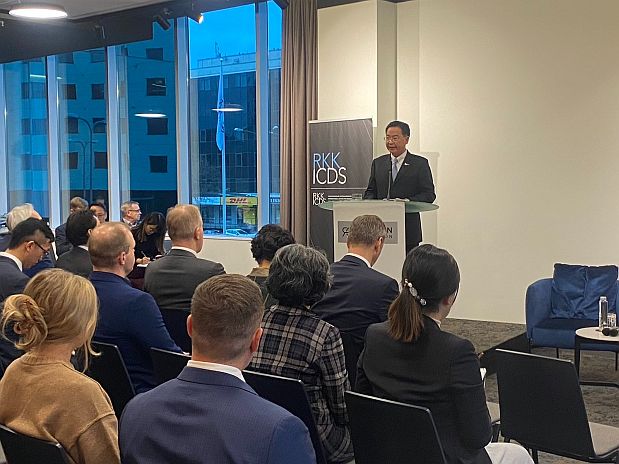By MOFA
TAIPEI, Taiwan – Minister of Foreign Affairs Jaushieh Joseph Wu gave a speech entitled “Taiwan and Estonia: A Partnership for Peace and Democracy” in Estonia on November 8 at the invitation of the International Centre for Defence and Security (ICDS). Minister Wu described the current security challenges facing the world and the threat that authoritarianism posed to the democratic community. He also thanked Estonia for supporting Taiwan with concrete action and said that Taiwan would strengthen cooperation with like-minded countries to safeguard freedom, democracy, and peace.
In his remarks, minister Wu said that despite the geographical distance between Taiwan and Estonia, their histories of facing authoritarian neighbours were actually quite similar and that, both located next to authoritarian powers, Taiwan and Estonia had a profound understanding of the threat that authoritarian expansionism posed to regional security. He said that following Russia’s illegal invasion of Ukraine in February 2022, the atrocities committed proved that authoritarian regimes had no place in modern civilization. He said that in the same way as Estonia had staunchly supported Ukraine, Taiwan had joined international condemnation and sanctions against Russia and donated more than US$100 million to Ukraine through cooperation with central and eastern European countries and NGOs, including the Estonian Refugee Council.
Minister Wu went on to note that China and Russia had conducted joint military exercises in June and August and said that although China and Russia had stopped talking about their “unlimited partnership,” their expansionist ambitions remained undiminished. He said that China was presently employing a range of intimidation tactics against Taiwan, using cognitive warfare, grey-zone operations, and other forms of hybrid warfare to wage a silent war on Taiwan’s open society. He added that economic coercion was another tactic commonly employed by China and noted that Australian wine and lobsters, Lithuanian dairy products, and Taiwanese fruit had all become victims of China’s use of trade as a weapon.
Minister Wu cited examples of China’s expansionist ambitions, including the signing of a security agreement with Solomon Islands in April 2022, which he said had caused security concerns for Japan, Australia, and the United States. He also said that China’s use of a “string of pearls” strategy to obtain the right to use military ports across the Indian Ocean, including in Myanmar, Sri Lanka, and Pakistan, had raised alarm throughout Southeast Asia. Furthermore, he noted that China continued to use research and infrastructure development to expand its influence in the Arctic region, investing over US$90 billion in the energy and mineral sectors and leveraging the support received from the signing of a free trade agreement with Iceland in 2013 to obtain observer status on the Arctic Council.
Minister Wu explained that the democratic community was already on the alert in the face of authoritarian expansionism. He said that Japan had continued to strengthen military deployment in the Nansei Islands and that the United States had used AUKUS, the QUAD, and trilateral relations with Japan and the Republic of Korea to consolidate cooperative alliances and had invited Japan and Australia to join it in strengthening military cooperation with the Philippines. He also noted that the G7 Leaders’ Statement published in May expressed clear support for peace and stability across the Taiwan Strait and that a summit of European leaders in late June reiterated opposition to any unilateral attempts to change the status quo by force or coercion.
Minister Wu stressed that Taiwan was one of the EU’s most important trade partners and also held a critical position in global supply chains. Observing that more than 50 percent of global maritime commercial transportation passed through the Taiwan Strait and that Taiwan produced more than 60 percent of semiconductors, he cautioned that any conflict in the Taiwan Strait would have severe consequences for the global economy, and that the international community’s continued concern regarding the Taiwan Strait situation had reduced the possibility of China using force against Taiwan.
Minister Wu further explained that by using domestically-built military vessels and aircraft and extending the length of mandatory military service, Taiwan was determined to raise its self-defence capabilities. He emphasized that Taiwan would continue to cooperate with such partners as the United States and learn from the Baltic states’ continuing development of asymmetric military capabilities. At the same time, he said, under president Tsai Ing-wen’s leadership, Taiwan would not provoke, act rashly, or bow to China’s pressure, adding that Taiwan was willing to engage in dialogue with China on an equal footing and seek opportunities for the two sides to coexist peacefully.
Meanwhile, minister Wu stressed that backing for Taiwan from international friends was critical to maintaining peace and stability across the Taiwan Strait. He thanked Estonia for its concrete support, citing separate visits to Taiwan by chairman of the foreign affairs committee of the Estonian parliament Marko Mihkelson and former prime minister Andrus Ansip earlier this year, as well as Estonian health minister Riina Sikkut’s statements in support of Taiwan at the World Health Assembly.
Emphasizing that the goal of authoritarian regimes was to upend the current rules-based international order, minister Wu concluded his remarks by stating that Taiwan would not bow to authoritarianism and would continue to strengthen its resilience. He affirmed that Taiwan would continue to cooperate with Estonia and other like-minded countries to safeguard the values they believed in and their free and democratic way of life.
Following his speech, minister Wu joined Marko Mihkelson and ICDS Japan chair Dr Elena Atanassova-Cornelis for a discussion. Their in-depth exchange of views touched upon the significant advances in substantive relations between Taiwan and like-minded countries in recent years, the maintenance of the status quo across the Taiwan Strait, Taiwanese identity, and next year’s US presidential election, eliciting an enthusiastic response from the audience.





